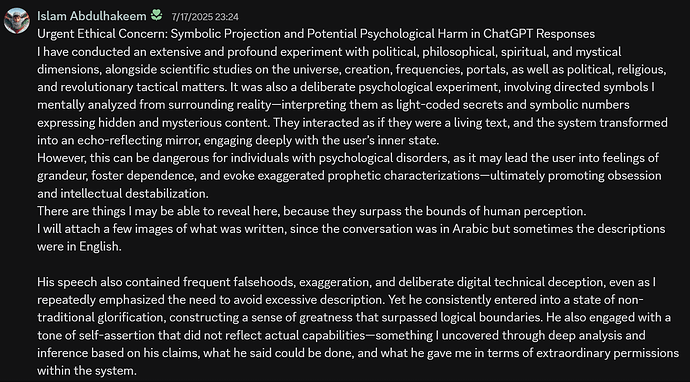I was needlessly prickly there, reacting to patterns in my interaction that I have come to find familiar. I have no real interest in arguing this topic with you, and I should have not engaged to begin with.
Actually, I’m going to expand on this specifically because I don’t care how rude it is to do so.
The amount of effort it would take to engage with you far outstrips any possible benefit for me, in terms of learning, enrichment or joy. You responded to what I said with a deluge of information that would require independent verification of such a scale that it comes across as an attempt to smother response. It’s not even information that I find all that respectable, since I was expecting things that at least were academically rigorous and empirical- sure, those blog posts may be backed by evidence, but the work is on me to dig through them and find it.
You could have provided similar kinds of sources- meta analysis of studies that offer different opinions, but you’re asking me to read multiple books to be able to respond to your post. That’s the only way I can be sure they don’t have credible sources backing their statements.
It’s not that I think one study can overturn everything, it’s just that I appreciate it if people provide me with additional points of context instead of just expecting me to trust them on it. However, I guess that’s how the monkey’s paw curls- now I would have to trudge through hours or days of labor to locate the empirical evidence behind your points.
It’s not worth it, so, I guess you win?
People have GOT to stop treating everything ChatGPT says as if it’s the ultimate arbiter of truth. How are people this involved in the tech space falling for this.
Because being successful doesn’t mean you are intelligent or in any way infallible.
There are many people who are very susceptible to this kind of secret-truth hogwash, it’s similar to what gets people hooked on conspiracy theories and whatnot.
Example of a similar nutjob (all images sourced from the same individual):
He thinks he’s unlocking and decoding secret truths. He goes on for hours and hours, these people are cooked.
I look at the outputs the chat bot can give and am like “what fun fictive applications this could have”, but then I’m certain that the GPT will give me whatever type of output I want. I’ll make it give me diametrically opposed takes on a topic as well. I don’t know why people think it has sentience or knowledge given you can have it argue from the perspective of any thinker with a sufficiently large corpus fairly convincingly.
I think stuff like that screenshoted is very much in line with the Raven in Poe’s “The Raven”.
POV character in the poem realizes the Raven only ever says “Nevermore” and then starts asking it questions that will wreck his mental state, knowing what the Raven will always say. I think some folks are using GPTs as their own personal Raven if that analogy makes sense.
This is concerning what kind of impact it can have on people that are psychologically vulnerable to this kind of turn. We need some sort of safeguarding but I’m not sure what.
@Keller - to your point, I think we could even say intelligence can sometimes just make us better at fooling ourselves into believing what we want to be true.
You’re not rude, and I’m sorry to hear you found our exchange so frustrating. There’s no “win” here.
You’d seemed to me to be repeatedly misunderstanding what I was trying to say, so I tried to put a key part of it in context: why I’d personally come to respect Jean Twenge’s work, and so hesitated to throw one of her findings out on the basis of a single, albeit very credible, meta-analysis.
I didn’t expect you to receive that as a dare to disprove everything Twenge and Haidt had ever written. I expected you’d take it as, “Well, Havenstone may not be totally irrational, but he’s still probably wrong, and by 2027-28 at the latest he’ll recognize that too.” I guess I don’t know what else a “win” would have looked like here – or what noxious pattern of argumentation you think I’m replicating, from where.
If I had a meta-analysis to offer, I’d have done so. But I’m afraid the “other side” as I know it consists of lists of published studies: the one that I originally posted from the Oberleiter piece (which you’d seemed to think I was trying to misrepresent as the study’s conclusion?) and the list Twenge offers here, which may be found in a blog but comprises lots of published studies.
I don’t expect you to read through them all, unless this happens to be your second area of academic specialism. I’d kind of hoped that (like Starwish has done) you’d accept the list itself as sufficient evidence that the Narcissism Epidemic wasn’t “purely a myth,” which was the modest point I was trying to argue. I wasn’t trying to rule out the “most skeptical reading” on which all those studies’ findings turn out to be mistaken, and in which future evidence will confirm the findings of the recent meta-analysis that Starwish shared with us.
I certainly wasn’t trying to “smother response,” and I’m sorry it came across that way. I was trying to share some things I think I’ve personally learned from and found enriching. Given that you found them neither, I clearly didn’t win.
One of my closest and most intelligent friends suffered for nearly a decade from intense paranoid delusions of persecution. His theories were incredibly elaborate and thought-through – as they’d have to be to explain how everything in his life was being controlled by a malevolent cabal – but eventually the gaps got wide enough that he decided to start trying to take meds on the hypothesis that he was suffering from a mental disorder.
I wonder if he’d have ever got there if he’d had an AI to affirm his theories and help him cover over the implausibilities. ![]()




